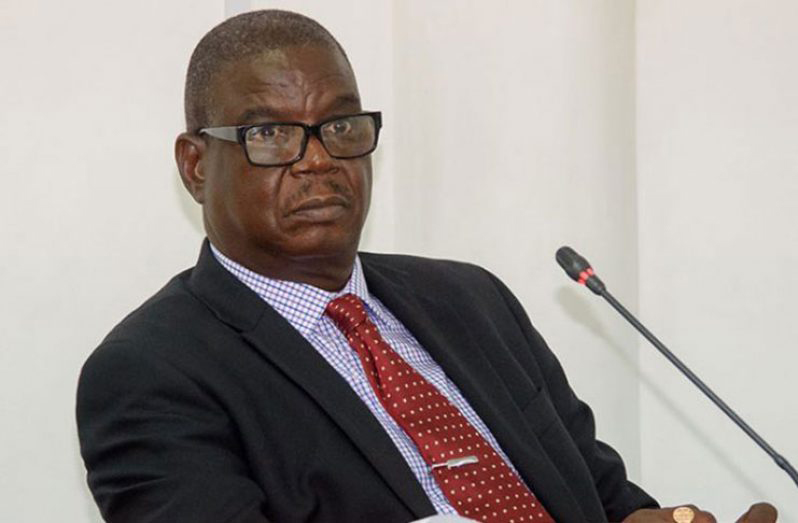sets record straight on ‘constitutional atrocity’ under former APNU+AFC gov’t
ATTORNEY-GENERAL and Minister of Legal Affairs, Mohabir Anil Nandlall, S.C., has publicly refuted claims made by former Police Service Commission (PSC) Chairman Paul Slowe, and has called him out for perpetuating a “false narrative” surrounding the appointment of former Police Commissioner (ag) Nigel Hoppie by the then APNU+AFC government.
In the letter penned by Nandlall, he takes aim at Slowe’s assertions in response to an article published in the Guyana Chronicle on September 2, 2023. In this article, Nandlall criticised what he referred to as a “constitutional atrocity” related to Hoppie’s appointment.
Slowe’s letter, according to Nandlall, has attempted to challenge the veracity of Nandlall’s claims regarding the appointment process. Nandlall, however, contended that Slowe’s arguments are misguided and that they do not align with the constitutional provisions in question.
Nandlall’s remarks revolve around the appointment of Hoppie to act in the Office of Commissioner of Police on July 30, 2020. The letter indicating the appointment was issued by then Permanent Secretary of the Ministry of Public Security following the retirement of Commissioner of Police Leslie James.
Nandlall asserted that Hoppie’s appointment as Acting Commissioner of Police by the APNU+AFC Government was made via a letter from the Permanent Secretary of the Ministry of Public Security.

The letter, according to Nandlall, was addressed to then-Commissioner of Police Leslie James, who was slated to proceed on 274 days of pre-retirement leave. The letter also granted approval for Deputy Commissioner Nigel Hoppie to perform the functions of the Commissioner of Police during this period.
According to Article 211 of Guyana’s Constitution, the Commissioner of Police and Deputy Commissioner of Police should be appointed by the President after consultation with the Leader of the Opposition and Chairperson of the Police Service Commission.
Furthermore, it outlines the procedures for appointing an acting Commissioner of Police in case of a vacancy or the incumbent’s inability to perform their duties.
Nandlall maintained that Hoppie’s appointment did not align with the constitutional process, as it did not follow the prescribed steps outlined in Article 211.
He argued that the use of the phrase “to perform the functions of Commissioner of Police” in the letter from the Permanent Secretary cannot circumvent the Constitution’s clear language.
In his response, Nandlall highlighted the legal principle that the law considers substance over form, citing the English case of Street v. Mountford (1985) as an example.
He argued that regardless of the linguistic formulation used, an appointment “to perform the functions” of Commissioner of Police is, in essence, an appointment “to act” as Commissioner of Police.
Nandlall also referenced the case of Christopher Jones v. Attorney General and Clifton Hicken from 2022, when the Chief Justice described Hoppie’s appointment as a constitutional “non-compliance.”
However, he pointed out that the appointment of Hicken as Acting Commissioner of Police was upheld as lawful and compliant with Article 211 in the same judgment.
In her ruling, Chief Justice (ag) Roxane George said: “It does seem disingenuous to advance a strict application of the constitutional provisions on the appointment of the Commissioner of Police, when the letter from the PS suggests that there may have been a breach of the Constitution [in appointing Nigel Hoppie to act] as no reference was made to the art 211 process.”
Nandlall said: “Inexplicably, Mr. Slowe dedicated quite a few paragraphs to ranting and wailing against His Excellency’s appointment of Mr. Clifton Hicken’s to act in the office of Commissioner of Police. In a 21-page judgment rendered by George CJ in the case filed by Christopher Jones referenced above and widely carried in the local press, this appointment was upheld and declared lawful and in compliance with the Constitution.”
The Attorney-General contended that the appointment of Hoppie as Acting Commissioner of Police did not adhere to the constitutional process, and this issue should be addressed to ensure that the rule of law is upheld.
Nandlall’s revelation follows questions from the opposition over the extension of Clifton Hicken’s tenure as acting Commissioner of Police by President, Dr. Irfaan Ali.
Opposition member Carol Smith-Joseph, acting as the Chief Scrutineer for the PNC-led APNU opposition, filed a Fixed Date Application (FDA) challenging this extension. Smith-Joseph argued that there is no legal basis for the Head of State to prolong the term of an acting Police Commissioner.
In her legal filings, Smith-Joseph contends that Hicken is currently serving in a temporary, acting capacity in accordance with Article 211 (2) of the Guyanese Constitution, not as a substantive Commissioner of Police.
She argued that Hicken’s appointment as Police Commissioner was initially based on necessity due to the absence of a duly constituted Police Service Commission (PSC) and a Leader of the Opposition. However, these circumstances no longer exist.
Nandlall had previously affirmed that President Ali acted in complete accordance with the laws when extending the tenure of Hicken as acting Commissioner of Police beyond his age of retirement.
The Attorney-General addressed criticisms raised by Leader of the Opposition, Aubrey Norton, and Clinton Conway, which were centred on the legality of the extension.
According to Norton, the appointment was deemed unlawful, owing to the belief that the Office of the Commissioner of Police could enjoy an extension only if the office holder had a substantive appointment.
Nandlall, however, countered this argument by asserting that there is no provision in the Constitution or any other law that restricts the extension of tenure solely to substantive appointees.
He said that regardless of if the appointee is acting or is substantive, they enjoy all the powers, facilities, and privileges of the office.












